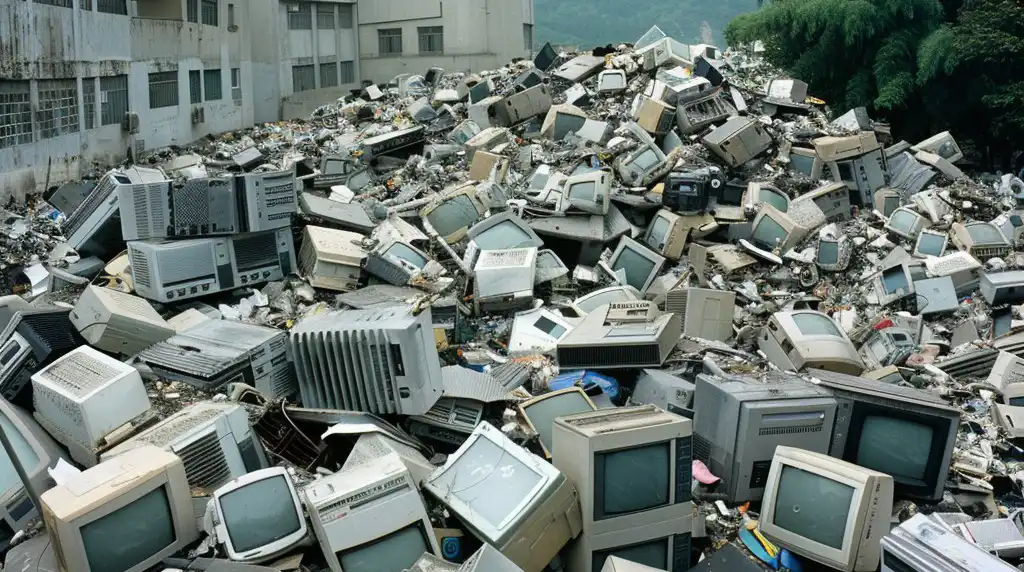Ever considered what becomes of your old computer when you get a new one? Many of us dump it in the trash and never think about how does discarding computers in a landfill affect the environment?
Discarding computers into landfills is a growing problem badly affecting our planet. What is even shocking is that alone in 2019, more than 53 million metric tons of e-waste were produced in the entire world. It weighs about as much as 4,500 Eiffel Towers.
You would be surprised to find out that the toxic waste in landfills is 70% a result of discarded electronics and electronics make up only 2% of all waste.
This article will give better ways to handle the computers to save our environment and explain what happens to our computers inside the landfills when thrown away.
How does discarding computers in a landfill affect the environment?
Discarded computers in landfills cause a significant threat to the environment. These devices possess poisonous substances such as lead, mercury, and cadmium. When these are badly disposed of, they could easily leak into the soil and water sources. The result is that both the human and wildlife get poisoned.

The world today just can’t work without using computers, but the production and disposal of these machines have created a huge line of ecological problems.
Hazardous Materials: Within the computer are a number of harmful elements that include metal elements. Among these hazardous heavy metals are mercury, lead, beryllium, cadmium, and dioxins. This potentially causes pollution of soil, water, and air, posing serious health risks.
Environmental Consequences of Improper Disposal:
- Water Pollution: Heavy metals from batteries and circuits poison groundwater, harming both animals and human beings.
- Fire Hazards: Computers contain flammable batteries that could potentially fuel fires at the landfills.
- Plastic pollution: Computers mostly contain plastic, which takes a long time to decompose and can release toxic particles.
- Air Pollution: Burnt E-waste disposes toxic chemicals in the atmosphere causing unhealthy smog, global warming and also diseases.
- Health Risks: Exposure to toxins from e-waste can lead to skin cancer, lung diseases and other diseases.
- Resource reduction: Precious metals extraction within the developing world can easily be a source of some toxics in the surroundings besides resource reduction.
Energy Consumption: Computers consume much energy, using a large portion of the electricity, thus greenhouse gases are released. Its increase will need more consumption of fossil fuels. The recent surge in cryptocurrency mining and NFT creation has further intensified this issue.
Manufacturing Impact: The production process of computers involves the extraction of raw materials like metals and plastics, which is affecting the ecosystems and further contributes to pollution.
Dumping computers in landfills is harmful to the environment. It releases hazardous materials, contributes to e-waste, and increases greenhouse gas emissions.
The Environmental Impact of Discarding Computers

The disposal of computers to landfills tends to adversely affect the environmental setting by releasing hazardous waste, forming e-wastes, and increasing the greenhouse gas emissions. Recycling and proper disposal help preserve our environment and resources.
The Rise of E-Waste
E-waste is calculated to be 74.7 million metric tons by 2030, if existing practices of disposal continue. Computer disposal in landfills is a harmful practice toward the environment. Responsible actions can help save the planet and ensure a sustainable future.
Burning of e-waste releases chemicals into the air, which prove to be hazardous, including dioxins and furans, causing health hazards and air pollution.
When considering how does discarding computers in a landfill affect the environment? We must be responsible for what we do and pick actions that protect and improve the world for all of us and future generations.
Real World Examples and Statistics
Real-world examples of environmental damage
The largest e-waste dumping site is the one in Guiyu, China, with soil and water heavily poisoned by toxic elements that came from discarded electronics, hence extreme environmental degradation and serious health conditions for the local population.
Data on e-waste accumulation and its effects
According to a 2020 report, only 17.4% of worldwide e-waste was recycled. The rest remains in piles in landfills or finds its way elsewhere, leading to large environmental damages and loss of resources.
Health Risks
Impact on human health
Exposure to toxic compounds associated with e-waste can cause serious health concerns. Among them is lead as an element that affects a person’s nervous system, kidneys, and reproduction systems. Mercury, likewise, is harmful to a person’s brain and other human organs.
Long-term effects of exposure to hazardous materials
Long-term exposure to hazardous materials from e-waste leads to chronic health conditions, including cancer and neurological disorders. These are especially risky for workers engaged in simple recycling sectors and communities around the dumping sites for e-waste.
Solutions and Steps

When we look at how does discarding computers in a landfill affect the environment, we must listen to experts. The Environmental Protection Agency (EPA) counsels us on handling electronic waste and cautions against improper disposal of items.
How to recycle your old computer
The procedure is very easy and also eco-friendly for recycling the old computer. Most electronic stores have programs to recycle back your appliances to properly dispose of them, and many states also offer certified electronic waste recycling facilities. These ensure safe disposal and recovery of valuable materials.
Recycling e-waste helps conserve resources and protect the environment. It recovers valuable materials such as gold, silver, and copper, reducing the need for mining. Also, it prevents hazardous substances from polluting the environment.
Benefits of Recycling E-Waste
Recycling e-waste helps conserve resources and protect the environment. It recovers gold, silver, and copper from waste electronics, which has the effect of lessening demands for digging. It also avoids hazardous substances from polluting the environment.
E-Waste Disposal Laws and Regulations
Many countries regulate proper dumping of e-waste. For example, the European Union has the Waste Electrical and Electronic Equipment (WEEE) Directive, guiding proper disposal and recycling.
E-waste laws in the United States are state-based. Every manufacturer needs to make a recycling offer for electronic products in all states. Check local rules for the state you live in so that you know what’s your responsibility.
For more information on how e-waste affects the environment, check out resources such as National Geographic.
Sustainable Disposal Methods

Recycling Programs
Many manufacturers and retailers have good recycling programs for old electronics. These programs ensure environmentally friendly disposal, with materials recovered and safe management of hazardous substances.
Donating and Refurbishing
Consider donating your old computer to schools, non-profits, or organizations that refurbish electronics for reuse. This prolongs the device’s life, helps other people, and reduces e-waste.
Proper Disposal
Dispose of your old computer in a proper e-waste manner and look for certified e-waste recycling centers or community collection events. Do not forget to wipe your data to preserve privacy.
Conclusion
Proper disposal of computers is important to protect the environment and conserve resources and promote sustainability.
Do not send them to landfills, where toxic chemicals and heavy metals could leak out. Instead, seek recycling or donate your used devices.
FAQ's
How is the environment impacted by computers being thrown away in landfills?
Discarding computers in landfills releases toxic chemicals into the environment. It contaminates soil and water, and contributes to climate change.
What are the environmental impacts of disposing computers?
Disposing of computers in landfills contributes to the growing problem of e-waste, releasing toxic chemicals into the environment and harming ecosystems.
How do computers have a negative impact on the environment?
Computers have a negative impact on the environment through their production, use, and disposal. The mining of raw materials, manufacturing processes, energy consumption during use, and improper disposal as e-waste all contribute to environmental pollution and loss of resources.
Can old computers be refurbished and reused?
Yes, old computers can often be refurbished and reused. Donating them to organizations that specialize in refurbishing electronics is a great way to extend their life and reduce e-waste.




